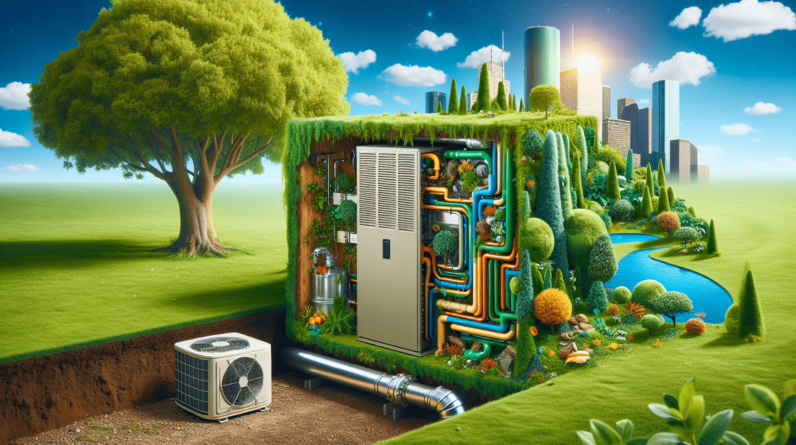
Have you ever considered how your HVAC system impacts both your comfort and your energy bills? The choice between geothermal and traditional HVAC systems can significantly influence these factors, especially in a place like Houston, TX. Let’s break down the differences and help you make an informed decision.
Understanding HVAC Systems
HVAC stands for Heating, Ventilation, and Air Conditioning. It’s the system responsible for maintaining indoor climate and air quality, crucial for comfort, especially in the unpredictable Houston weather.
Traditional HVAC Systems
Traditional HVAC systems typically include furnaces and air conditioners that rely on gas or electricity. These systems are what most people are familiar with and are commonly used across the country.
-
Components: A traditional system generally consists of an indoor unit known as a furnace and an outdoor air conditioning unit.
-
Heating Method: Furnaces usually operate by burning natural gas or using electric heating elements, depending on your setup.
-
Cooling Method: Air conditioners work by exchanging heat; they take heat from inside your home and release it outside.
Pros of Traditional HVAC Systems
- Initial Cost: Generally lower installation costs compared to geothermal systems.
- Availability: Their familiarity among technicians makes repairs and maintenance easier.
- Quick Installation: Installing a traditional HVAC system is usually faster than setting up a geothermal solution.
Cons of Traditional HVAC Systems
- Energy Efficiency: These systems tend to be less energy-efficient than geothermal options, leading to higher bills.
- Environmental Impact: They typically rely on fossil fuels, which can contribute to environmental issues.
- Long-Term Costs: While initial costs are lower, continuous energy costs can add up over time.
Geothermal HVAC Systems
Geothermal systems utilize the stable temperatures found underground to provide heating and cooling. This efficiency is a hallmark of geothermal systems, making them an attractive option for eco-conscious homeowners.
-
Components: A geothermal system primarily consists of a ground loop, a heat pump, and a distribution system.
-
Heating Method: These systems draw warmth from the earth in winter and use it to heat your home.
-
Cooling Method: In the summer, they transfer heat from your home into the ground, efficiently cooling your living space.
Pros of Geothermal HVAC Systems
- Energy Efficiency: Geothermal systems are renowned for their efficiency, often achieving 400% efficiency during heating modes.
- Long-Term Savings: While the upfront cost is higher, you may see significant savings on energy bills over time.
- Environmental Benefits: Lower carbon footprint due to reduced reliance on fossil fuels.
- Longevity: Geothermal systems typically last longer than traditional systems, with ground loops lasting over 50 years.
Cons of Geothermal HVAC Systems
- High Initial Cost: Installation costs can be significant, often deterring potential buyers.
- Installation Complexity: Geothermal systems require considerable groundwork, which can be disruptive.
- Space Requirements: You may need adequate land for the ground loop installation, which can be a limiting factor for some properties.
Comparing Energy Efficiency
Energy efficiency is crucial in today’s world, especially in the energy-conscious environment of Houston. The efficiency of an HVAC system can be measured using the Seasonal Energy Efficiency Ratio (SEER) for cooling systems and the Annual Fuel Utilization Efficiency (AFUE) for heating systems.
| System Type | SEER Rating | AFUE Rating |
|---|---|---|
| Traditional Air Conditioner | Typically 13–20 | 80% – 98% |
| Gas Furnace | 80% – 95% | |
| Geothermal Heat Pump | 20–40 | Up to 400% |
As you can see, geothermal systems not only offer higher SEER ratings for cooling but also a remarkable AFUE rating reflecting impressive efficiency in heating.

Environmental Impact
In a time when everyone is looking to ‘go green,’ your choice of an HVAC system can either contribute positively or negatively to the environment.
Carbon Footprint
Traditional systems, particularly gas furnaces, are major contributors to greenhouse gas emissions. In contrast, geothermal systems have a significantly lower carbon footprint because they use renewable energy directly from the earth.
Local Regulations and Incentives
In Houston, you may find local regulations and incentives aimed at encouraging homeowners to adopt energy-efficient systems. Be sure to check with local energy providers or government resources to learn more about potential tax credits and rebates for installing geothermal systems.
Comfort and Installation Considerations
Comfort Levels
While both systems provide comfortable indoor environments, geothermal systems often excel due to their ability to maintain consistent temperatures. Unlike traditional systems, which can create hot or cold spots, geothermal systems provide even heating and cooling throughout your home.
Installation Process
The installation process for both systems is different. Traditional HVAC systems can generally be installed quickly, whereas geothermal systems require significant groundwork and planning.
| Installation Aspect | Traditional HVAC | Geothermal HVAC |
|---|---|---|
| Duration | 1-3 days | 1-2 weeks |
| Groundwork Needed | Minimal | Extensive |
| Disruption to Landscape | Low | High |
| Noise Levels | Common (outdoor units) | Minimal (quiet operation) |
Maintenance Requirements
Just like any other system in your home, maintaining your HVAC system is crucial for its efficiency and lifespan.
Traditional HVAC Maintenance
- Regular filter replacements every 1-3 months.
- Annual inspections for both the furnace and air conditioner.
- Duct cleaning every few years to ensure good airflow.
Geothermal Maintenance
- Inspecting the ground loop and connections yearly.
- Checking the heat pump and indoor components annually.
- Keeping the outdoor areas clear of debris.
While both systems require maintenance, geothermal systems generally have lesser ongoing maintenance needs due to fewer moving parts.
Financial Savings Over Time
When weighing the pros and cons, it’s essential to consider the long-term financial impact of your choice.
Initial Investment vs. Long-Term Savings
| Parameter | Traditional HVAC | Geothermal HVAC |
|---|---|---|
| Average Installation Cost | $3,000 – $8,000 | $10,000 – $30,000 |
| Average Monthly Energy Cost | $200 – $350/month | $100 – $200/month |
| Lifespan | 15-20 years | 25-50 years |
Over time, the lower operating costs of a geothermal system can help mitigate the higher upfront costs, making it a more economically viable option in the long run.
Conclusion: Making the Right Choice for Houston
Deciding between a geothermal and traditional HVAC system ultimately depends on your specific needs, budget, and long-term goals. If you prioritize energy efficiency, environmental impact, and long-term savings, a geothermal system may be the better choice for you. However, if upfront costs are paramount and you need something that can be installed quickly, a traditional HVAC system may suit your current situation better.
No matter which route you take, ensuring your home is comfortable, efficient, and environmentally friendly should be your ultimate goal. Take your time weighing these factors, and consider consulting with a local HVAC expert to further discuss your options tailored to Houston’s unique climate.








